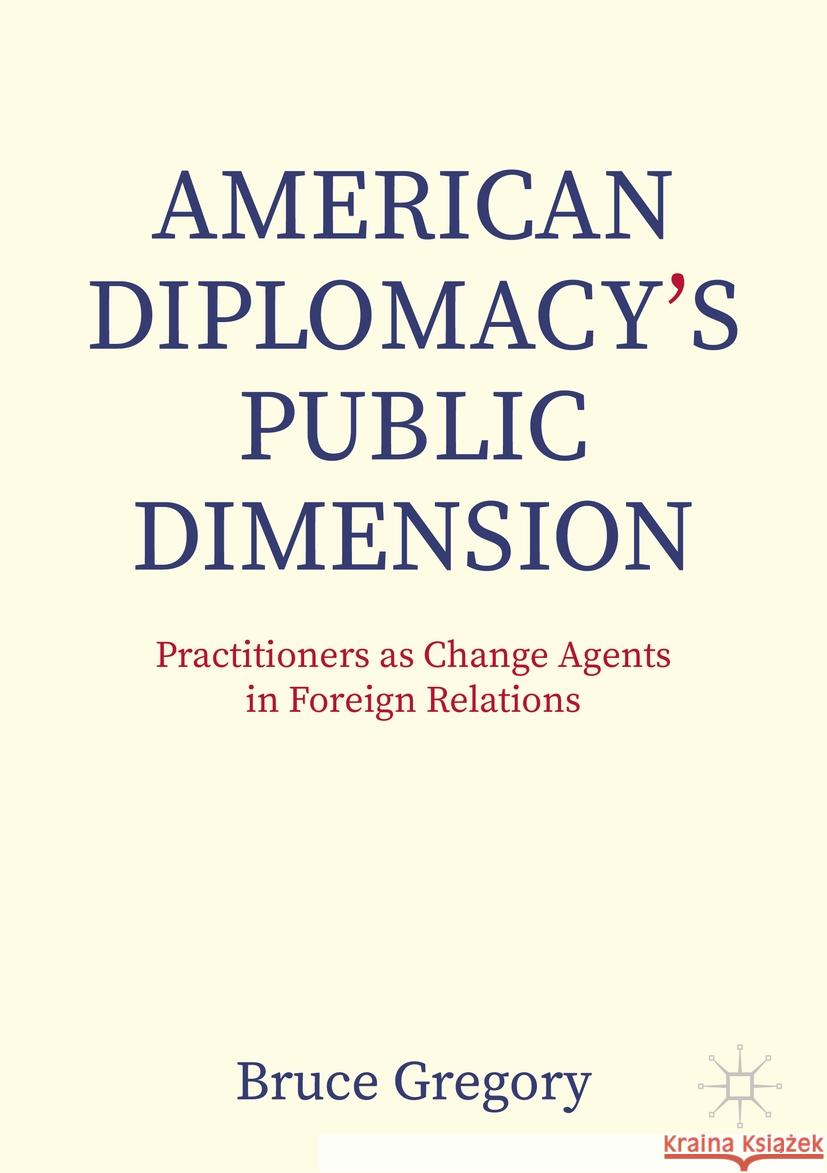American Diplomacy's Public Dimension: Practitioners as Change Agents in Foreign Relations » książka



American Diplomacy's Public Dimension: Practitioners as Change Agents in Foreign Relations
ISBN-13: 9783031389160 / Angielski
American Diplomacy's Public Dimension: Practitioners as Change Agents in Foreign Relations
ISBN-13: 9783031389160 / Angielski
(netto: 153,32 VAT: 5%)
Najniższa cena z 30 dni: 154,18
ok. 16-18 dni roboczych.
Darmowa dostawa!
Contents
Introduction
Part I, Precursors and Concepts
1 Colonial Era Foundations
2 Turning Points in a New Nation
3 Framing Practitioner Communities
Part II, 20th Century Practitioners
4 Borrowing from Civil Society, 1917-1947
5 Foreign Service – Building a Foundation, 1948-1970
6 Foreign Service – Transforming Diplomacy, 1970-1990
7 Cultural Diplomats
8 International Broadcasters
9 Soldiers
10 Covert Operatives and Front Groups
11 Democracy Builders
12 Presidential Aides
Part III, 21st Century US Diplomacy
13 Reinvention and Fragmentation
14 A Failure to Communicate?
15 Drivers of Change
16 What Happens Now?
Acronyms
Selected Bibliography
Acknowledgments
Index
Bruce Gregory taught graduate and undergraduate courses on public diplomacy at Georgetown University and George Washington University for nearly seventeen years. Prior to that, his 33-year government career included positions at the Department of State, U.S. Information Agency, 13 years as executive director of the U.S. Advisory Commission on Public Diplomacy, and three years on the faculty of the National War College. Publications include peer-reviewed articles and book chapters, public policy reports, and a bimonthly literature review.
This is the first book to frame US public diplomacy in the broad sweep of American diplomatic practice from the early colonial period to the present. It tells the story of how change agents in practitioner communities – foreign service officers, cultural diplomats, broadcasters, citizens, soldiers, covert operatives, democratizers, and presidential aides – revolutionized traditional government-to-government diplomacy and moved diplomacy with the public into the mainstream. This deeply researched study bridges practice and multi-disciplinary scholarship. It challenges the common narrative that US public diplomacy is a Cold War creation that was folded into the State Department in 1999 and briefly found new life after 9/11. It documents historical turning points, analyzes evolving patterns of practice, and examines societal drivers of an American way of diplomacy: a preference for hard power over soft power, episodic commitment to public diplomacy correlated with war and ambition, an information-dominant communication style, and American exceptionalism. It is an account of American diplomacy’s public dimension, the people who shaped it, and the socialization and digitalization that today extends diplomacy well beyond the confines of embassies and foreign ministries.
“The book … represents a terrific compendium of accumulated observation and wisdom from one of the central figures in the field of public diplomacy studies.”
Professor Nicholas Cull, University of Southern California, USA
“…beautifully written…This is not simply another good book on American public diplomacy: it will be the book on American public diplomacy”.
“. . . not only original but also potentially field shifting.”
“. . . highly readable for undergraduates and general readers, and yet intellectually sophisticated to satisfy hard-core scholars of many fields.”
Professor Geoffrey Wiseman, DePaul University, USA
"Bruce Gregory presents a thorough and elegantly written history of American diplomacy’s not always-successful efforts to influence the global public. This book will prove indispensable for public diplomacy scholars and practitioners".
Professor Philip Seib, Emeritus of Journalism and Public Diplomacy, University of Southern California, USA
“Gregory thinks like an academic while seeing public diplomacy through the lens of the work of the men and women who have put flesh on the bones of US public diplomacy policies…This book is steeped in deep knowledge and his exceptional dedication to getting our understanding of public diplomacy right.”
Professor Jan Melissen, Editor-in-Chief The Hague Journal of Diplomacy
"In this original study, Bruce Gregory provides an account of how the public dimension to America's diplomacy was present before the creation of the Republic, evolved in response to historical turning points and changes in the technologies of communication, and remains of vital importance today. For anyone who wants to know what is exceptional about America's public diplomacy -for good and ill- and how the challenges it faces today might be addressed, Gregory provides much-needed answers.”
Paul Sharp, Professor of Political Science, University of Minnesota Duluth
"A captivating explanation of the unique origins of American style diplomacy with a focus on public diplomacy. This compelling — and easy-to-read — digest of the history of American diplomacy is a must-have for international affairs students, teachers, and especially practitioners. As a foreign policy practitioner, I wish I had read (and been able to reread) a book like this earlier in my career as it answers the question of why we do things a certain way and more importantly how we can use our past experiences, history, and culture to set us on the right course for the future".
Roxanne Cabral, US Department of State, USA
Diplomacy’s Public Dimension, a masterful historical overview of American diplomatic communication, provides first-time insight into the evolution of U.S. public diplomacy from the colonial era to the present day. This book also offers a nuanced assessment of contemporary public diplomacy practices in the face of rapid technological transformation and increasingly “societized” diplomatic engagement. An exceptional blend of public diplomacy scholarship and deep institutional knowledge, this major work will appeal to diplomatic practitioners, professors, and policymakers.
Vivian S. Walker, Executive Director, U.S. Advisory Commission on Public Diplomacy
1997-2026 DolnySlask.com Agencja Internetowa
KrainaKsiazek.PL - Księgarnia Internetowa









